The-UK-(NO.1)英国英文介绍PPT
- 格式:ppt
- 大小:2.27 MB
- 文档页数:10
![英国皇室英文介绍(英语拓展作业)[优质ppt]](https://uimg.taocdn.com/4c6f8007b307e87101f69695.webp)

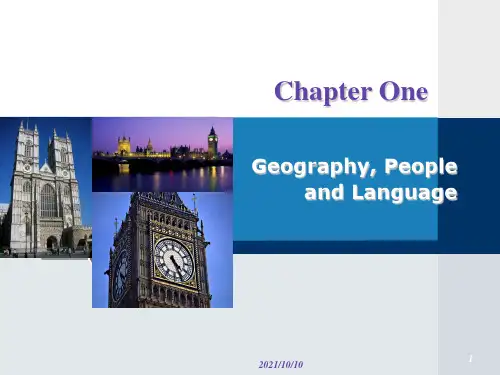


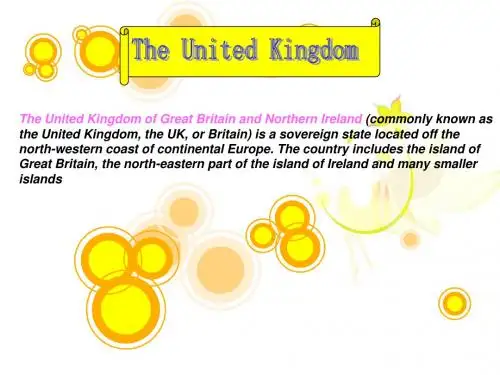

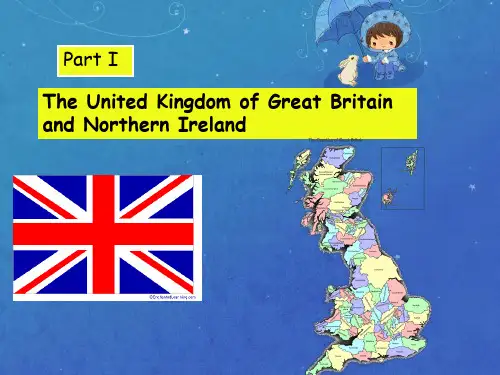

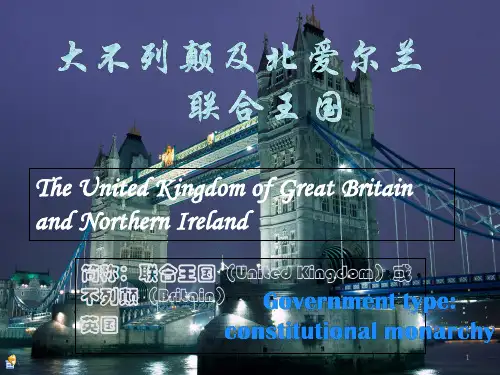
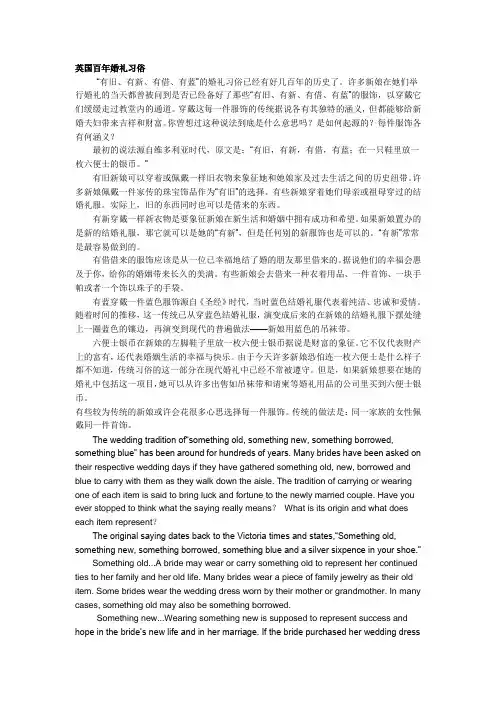
英国百年婚礼习俗“有旧、有新、有借、有蓝”的婚礼习俗已经有好几百年的历史了。
许多新娘在她们举行婚礼的当天都曾被问到是否已经备好了那些“有旧、有新、有借、有蓝”的服饰,以穿戴它们缓缓走过教堂内的通道。
穿戴这每一件服饰的传统据说各有其独特的涵义,但都能够给新婚夫妇带来吉祥和财富。
你曾想过这种说法到底是什么意思吗?是如何起源的?每件服饰各有何涵义?最初的说法源自维多利亚时代,原文是:“有旧,有新,有借,有蓝;在一只鞋里放一枚六便士的银币。
”有旧新娘可以穿着或佩戴一样旧衣物来象征她和她娘家及过去生活之间的历史纽带。
许多新娘佩戴一件家传的珠宝饰品作为“有旧”的选择。
有些新娘穿着她们母亲或祖母穿过的结婚礼服。
实际上,旧的东西同时也可以是借来的东西。
有新穿戴一样新衣物是要象征新娘在新生活和婚姻中拥有成功和希望。
如果新娘置办的是新的结婚礼服,那它就可以是她的“有新”,但是任何别的新服饰也是可以的。
“有新”常常是最容易做到的。
有借借来的服饰应该是从一位已幸福地结了婚的朋友那里借来的。
据说他们的幸福会惠及于你,给你的婚姻带来长久的美满。
有些新娘会去借来一种衣着用品、一件首饰、一块手帕或者一个饰以珠子的手袋。
有蓝穿戴一件蓝色服饰源自《圣经》时代,当时蓝色结婚礼服代表着纯洁、忠诚和爱情。
随着时间的推移,这一传统已从穿蓝色结婚礼服,演变成后来的在新娘的结婚礼服下摆处缝上一圈蓝色的镶边,再演变到现代的普遍做法——新娘用蓝色的吊袜带。
六便士银币在新娘的左脚鞋子里放一枚六便士银币据说是财富的象征。
它不仅代表财产上的富有,还代表婚姻生活的幸福与快乐。
由于今天许多新娘恐怕连一枚六便士是什么样子都不知道,传统习俗的这一部分在现代婚礼中已经不常被遵守。
但是,如果新娘想要在她的婚礼中包括这一项目,她可以从许多出售如吊袜带和请柬等婚礼用品的公司里买到六便士银币。
有些较为传统的新娘或许会花很多心思选择每一件服饰。
传统的做法是:同一家族的女性佩戴同一件首饰。
A Brief Introduction of the United KingdomThe full name of the country is the United Kingdom of Great Britain and Northern Ireland. It is a complicated name for what is in many ways a complicated country. There’re four parts, England, Scotland, Wales and Northern Ireland, which complete to the set.Here, as follows, are a few aspects of the United Kingdom.1. PoliticsThe Government of the United Kingdom(1) The MonarchyThe oldest institution of government is the Monarchy cruel by the king. This dates back to the Saxon who ruled from the 5th century AD until the Norman Conguest in 1066.The power of the monarchy was largely derived form the ancient doctrine of the ‘divine right of kings”. It was held that the sovereign derived his authority from God, not from his subjects.While the king in theory had God on his side, in practice even in medieval times it was thought that he should not exercise absolute power.(2) The ParliamentThe word “parliament”comes from the verb “the parley”, that is to discuss or talk. The term was first used officially in 1236 to describe the gathering of feudal barons and representatives from countries and towns which the occasionally summoned if he wanted to raise money.The Great Council came to include both those who were summoned “by name”(the House of Lords) and representatives of communities (the House of Commons). These two houses exist today and collectively we call them the parliament. The Commons quickly gained in political strength. They were willing to help the king by raising taxes and passing laws, but in return they wanted an increasing say in what the king was doing.The parliament became the most powerful institute in Britain was after the Revolutional War.Parliament has a number of different functions. First and foremost, it passes laws. Another important function is that it provides the means of carrying on the work of government by voting for taxation. Its other roles are to scrutinize government policy, administration and expenditure and to debate the majority issues of the day.Parliament is supreme in the British state because it alone has the power to change the terms of the constitution.There are no legal restraints upon parliament. It can make or change laws. Change or overturn established conventions or even prolong its own life withoutconsulting the electorate. However, it does not assert its supremacy, but bears the common law in mind and acts according to precedent..Each Parliament lasts for 5 years.The Upper house has no right to decide, it only has the right to pass the bills passed by the Lower House.The party which holds a majority of those “seats”in parliament forms the government, with its party leader as the Prime Minister. After a government has been in power for 5 years it has to resign and hold a “general election”, in which al British adults are give the chance to vote again for their constituency’s MP. A government cannot stand for longer than 5years except in exceptional circumstances. However, the Prime Minister can call an election sooner than 5years. This can happen when the government loses a “vote of no confidence” in the House of Commons. That is, an MP puts forward a statement for the MPs to vote on saying that “This house no longer ha confidence in the government.”(3) The Political PartiesThere are three major national parties: The conservative party and the Labour party are the two biggest, and any general election is really about which of those two is going to govern. But there’s a third important party, the Liberal Democrats, who usually receive up to about 20% of the votes: not enough to form a government, but enough to have a big impact on which of the other two parties does so.The Labour party is the newest of these three, created by the growing trade union movement at the end of nineteenth century. It quickly replaced the Laberal party as one of the two biggest parties. Labour is a socialist party. That is to say that they believe a society should be relatively equal in economic terms, and the part of the role of government is to act as a “redistributive” agent. The Conservative party is the party that spent most time in power, basically the Conservative are seen as the party of the individual, protecting the individual’s right to acquire wealth and to spend it how they choose , and so favouring economic policies which businessmen prefer, such as low taxes. They receive a lot of their party funding from big companies.2. Religion(1) Queen or king is the leader as well as the bishop of the High Church.(2) 20% of British citizen claims to be Roman Catholics.(3) 40% of Scotland citizen believe in Roman Catholic.(4) Two established churches: Church of London; Church of Scotland.(5) Roman Catholic churches.(6) Free Churches.3. CultureHere, I will emphasis on one aspect of Britain’s artistic output, that for which it is perhaps best known: Literature.⑴Early WritingMuch early British writing was concerned with Christianity: Anglo-Saxons produced beautifully illustrated versions of the Bible: the most famous of these is the book of keels, party written on the Scottish island of lona.⑵Elizabethan DramaThere was a general flowering of cultural and intellectual life in Europe during the 15th and 16th centuries which is known as “The Renaissance”, in British culture one of the most successful and long-lasting expressions of this development lay in drama.⑶18th –century English literature is marked by a rather large shiftfrom the mood and tone of 17th –century literature.⑷The Romantic PeriodRoughly the first third of the 19th century makes up English literature’s romantic period. Writers of romantic literature are more concerned with imagination and feeling than the power of reason, which marked the 18th century.⑸20th Century LiteratureThe 20th Century marked the end of the British Europe, which was replaced by the Commonwealth of Nations. Yet English civilization and culture continue to have a strong influence on the rest of the world. The heritage of English literature forms an outstanding part of that culture.20th Century literature can be broadly divided into two stylistic periods: Modernism, and Postmodernism. These periods roughly correspond to literature written after it. Both are characterized by a high degree of experimentation.4. EconomyNational economies can be broken down into three main areas: “primary”industries, such as agriculture, fishing and mining, “Secondary”industries, which manufacture complex goods from those primary products; and tertiary industries, often described as services, such as banking, insurance, tourism, and the selling of goods.Britain’s agricultural sector is small but efficient, producing 58% of the UK’s food needs with only 2% of its workforce. Three quarters of Britain’s land is used for agriculture, with about a quarter of that under crops-wheat and barley are the two commonest. The rest is grazing for animals.The fishing industry provides 55% of the UK demand for fish. Scottish ports land the majority of the fish caught.Energy production is an important part of the UK economy, accounting for 5% of the national wealth.In the secondary sector of the economy, manufacturing industry remains important, producing 22% of national wealth.The service sector of the United Kingdom is dominated by financial services, especially in banking and insurance. London is one of the world’s largest financial centers with the London Stock Exchange, the London international Financial Futures and Options Exchange, and the Lloyd’s of London insurance market all based in the city. It also has the largest concentration of foreign bank branches in the world. 5.British diplomatic affairs(1)Britain’s foreign policies:The contemporary foreign policy of the UK is greatly influenced by its imperial history and also by its geopolitical traits. Perhaps the most important single factor which influences British policy-makers is its history.A second decisive influence upon the way Britain conducts its external affairs is geopolitical. Britain is an island state, and this is considered an important psychological factor as well as one which has influenced Britain’s economic and military development as a nation of seafarers who roamed the globe looking for territory and economic opportunities.How these foreign policies made:The general direction of Britain’s foreign policy is mainly decided by the Prime Minister and Cabinet. The main government department is of course the Foreign and Commonwealth Office, but many other government ministers also play a part in formulating and executing the government’s decisions.The Ministry of Defence is responsible for ensuring Britain’s defence and managing Britain’s involvement in its military treaty commitments. And the Department of Trade and Industry is for the international trade policy and British commercial relations with other countries.(2)Britain and International Institutions:Nowadays its foreign policy is largely shaped by its participation in a number of important international institutions.Britain is one of the five permanent members of the United Nations Security Council, along with Russia, China, the Us and France. It is also the sixth largest contributor to the UN’s budget. As a Security Council member, Britain retains the ability to have a large influence on world affairs. And the more important to Britain today in running of its affairs is its membership in the EU. Britain is also a member of the Commonwealth. Even though Britain granted its colonial territories independence, it continued to feel close to these new countries and wanted to continue to work with them.(3)Security and Defence Policy:Britain depends more on defence than most other advanced industrial countries and maintains larger professional forces. The keystone of British defence policy is its participation in NATO, which is commonly known as the North Atlantic Treaty Orgnasition. In addition to its NATO commitments, Britain retains an independent nuclear weapons capability but it is highly unlikely for it to use, or need to use the capability.。
英国地理位置英文介绍Britain, located in the northwestern part of Europe, is an island country that has been an important center of Western civilization for centuries. Its geographical position has contributed significantly to its development, both in terms of cultural heritage and economic prosperity.1. Location and BoundariesEngland, Scotland, Wales, and Northern Ireland collectively make the United Kingdom. The country is surrounded by the North Sea to the east, the English Channel to the south, and the Atlantic Ocean to the west. Britain shares land borders with the Republic of Ireland to the west and has borders with two other countries, Scotland in the north and Wales in the west.2. Latitude and LongitudeBritain’s latitude ranges from 50° to 60° Nor th, and its longitude is between 2° and 7° West. Its location at such high latitudes results in cool summers and mild winters, with rain being common throughout the year. However, this wet climate contributes to the country's greenery andagricultural growth.3. Main Landforms and LandmarksThe country is defined by diverse landscapes, including rolling hills, mountains, lowlands, and coastal cliffs. The highlands of Scotland boasts the Ben Nevis, the highest peak in Britain, while the English Lake District features stunning lakes and mountains. Another famous landmark is the Stonehenge, an ancient stone circle in Salisbury, southern England.4. RiversThe UK has several rivers of varying sizes, including the longest river, the River Severn, and the River Thames which flows through London, the capital city. The Thames is perhaps the most famous river in the county and is the central artery for trade as it flows into the North Sea.5. Economic SignificanceBritain's location has made it an ideal center for trade and commerce. The country is a hub of international trade, with its seaports and airports facilitating international trade. The city of London, being the financial capital of the world, is home to the London Stock Exchange and attracts investors from all over the world.In conclusion, Britain's location has had a significant impact on its development. Not only has it enriched the country with cultural heritage, but it has also facilitated trade and commerce, contributing to its overall economic prosperity.。